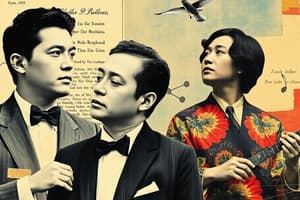Podcast
Questions and Answers
What is opera a blend of?
What is opera a blend of?
- Music, dance, and literature
- Music, theater, and visual arts (correct)
- Singing, acting, and poetry
- Instruments, staging, and scenic design
What is opera often seen as?
What is opera often seen as?
- A popular form of entertainment
- A contemporary innovation
- A cultural pillar (correct)
- A historical relic
Who referred to opera as 'Gesamtkunstwerk' or 'total work of art'?
Who referred to opera as 'Gesamtkunstwerk' or 'total work of art'?
- Wolfgang Amadeus Mozart
- Giuseppe Verdi
- Richard Strauss
- Richard Wagner (correct)
What is the primary way opera tells a story?
What is the primary way opera tells a story?
What is the nature of opera influenced by?
What is the nature of opera influenced by?
What was opera initially seen as?
What was opera initially seen as?
What is a key aspect of opera that allows it to convey emotions and stories?
What is a key aspect of opera that allows it to convey emotions and stories?
How has technology impacted the world of opera?
How has technology impacted the world of opera?
What is a unique aspect of opera that sets it apart from other art forms?
What is a unique aspect of opera that sets it apart from other art forms?
What themes does opera often address and explore?
What themes does opera often address and explore?
Why is opera relevant to audiences today despite its origins hundreds of years ago?
Why is opera relevant to audiences today despite its origins hundreds of years ago?
What is the nature of opera shaped by?
What is the nature of opera shaped by?
Flashcards are hidden until you start studying
Study Notes
Nature of Opera
Opera is a complex and multifaceted art form that has been a part of Western culture for centuries. It is a blend of music, theater, and visual arts that tells a story through singing, acting, and orchestral accompaniment. The nature of opera is influenced by its history, cultural significance, and the artistic elements that make it unique.
History of Opera
Opera originated in Italy in the late 16th century and quickly spread throughout Europe. It was initially seen as a highbrow, elitist form of entertainment, often associated with the wealthy and aristocratic classes. However, over time, opera became more accessible and eventually found a place in the broader cultural landscape. Today, opera is enjoyed by people from all walks of life and is a testament to the enduring power of art to transcend social and economic boundaries.
Cultural Significance
Opera is often seen as a cultural pillar, representing the culmination of the Western European historical musical tradition. It encompasses highly trained vocalists, instrumentalists, and stagecraft artists, and is considered by some to be the ultimate intersection of music, poetry, staging, scenic design, and acting. The composer Richard Wagner referred to opera as "Gesamtkunstwerk," or "total work of art," reflecting its comprehensive nature.
Artistic Elements
The nature of opera is shaped by its artistic elements, which include music, singing, acting, and orchestration. Opera singers use their voices to convey the emotions and stories of the characters they portray, often with the support of a live orchestra. The staging, costumes, and sets are designed to enhance the overall theatrical experience. The complexity of opera lies in its ability to combine these elements in a cohesive and captivating way, creating a unique artistic experience.
Opera and Technology
In recent years, technology has played an increasingly important role in the world of opera. Social media platforms and marketing strategies have helped to make opera more accessible and engaging to a broader audience. Live streaming broadcasts and on-demand content have made it possible for opera companies to reach audiences in different parts of the world. Technology has also opened up new possibilities for artistic expression, such as cloud opera and digital projections.
Opera and Society
Opera is often seen as a reflection of the society in which it is produced. It addresses and explores the fallible qualities of the human condition, with an emphasis on love, betrayal, and death. Its enduring themes make it relevant to audiences today, despite its origins hundreds of years ago. The social aspects of opera are evident in the images and myths that surround it, which often connect the operatic arena with mythological ritualisation and national traditions.
Conclusion
The nature of opera is complex and multifaceted, shaped by its history, cultural significance, artistic elements, and its relationship with technology and society. It is an art form that continues to captivate audiences and inspire artists, demonstrating the enduring power of music and theater to touch the human spirit.
Studying That Suits You
Use AI to generate personalized quizzes and flashcards to suit your learning preferences.




